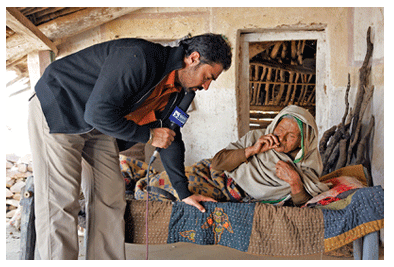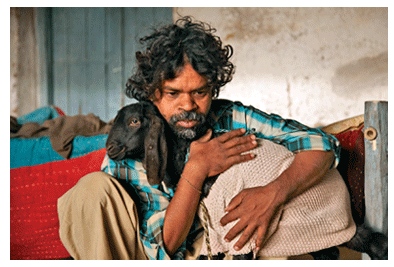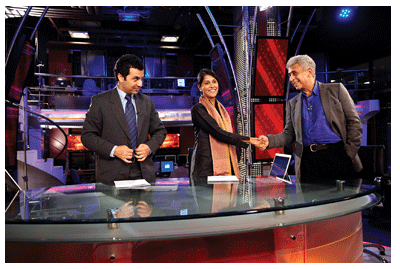- Prelude
- Editorial
- A Conversation with Jagdish Swaminathan
- Seeing is Very Important………
- Tormented Delineations and Violent Deformations
- Bikash Bhattacharjee: Subverting the Seen
- Bridging Western and Indian Modern Art: Francis Newton Souza
- Contesting National and the State: K K Hebbar's Modernist Project
- The Allegory of Return into the Crucial Courtyard
- Knowing Raza
- The Old Story Teller
- Beautiful and Bizarre: Art of Arpita Singh
- Feeling the Presence in Absence! Remembering Prabhakar Barwe
- Waterman's Ideal Fountain Pen
- Peepli Live: the Comic Satire Stripping off the Reality of Contemporary India
- Age of Aristocracy: Georgian Furniture
- Faking It - Our Own Fake Scams
- Scandalous Art and the “Global” Factor
- The Composed and Dignified Styles in Chinese Culture
- Visual Ventures into New Horizons: An Overview of Indian Modern Art Scenario
- The Top, Middle and Bottom Ends
- Top 5 Indian Artists by Sales Volume
- What Happened and What's Forthcoming
- The Month that was
- NESEA : A Colourful Mosaic
- Mumbai Art Sighting
- Art Events Kolkata
- Musings from Chennai
- Art Bengaluru
- Khoj, Kolkata Boat Project
- What a Summit!
- Ganesh Haloi at Art Motif
- The Other Self by Anupam Sud at Art Heritage, New Delhi
- Baul Fakir Utsav at Jadavpur
- Printmaking Workshop
- World's Greatest Never Before Seen Toy and Train Collection
- Previews
- In the News
- Christies: Jewellery Auction at South Kesington, London
ART news & views
Peepli Live: the Comic Satire Stripping off the Reality of Contemporary India
Volume: 3 Issue No: 13 Month: 2 Year: 2011
by Sarmistha Maiti
The whole genre of independent filmmaking with a small budget but a brilliant concept and content has completely revolutionized the art and craft of filmmaking and has given a facelift to the film industry with a parallel language. The distinction is no more categorized as “commercial” or “art” cinema, rather filmmaking in every sense has become a powerful medium of thought provocation, generating discourses and triggering issues from local to global concern before the worldwide audience. Indian cinema has indeed acquired the smartness in executing this art medium and 'Peepli Live' in an example of such film produced in 2010. It picks up a satirical tone in the expression of one of the biggest challenges  the Indian socio-economical system is facing with the peasant community committing suicides.
the Indian socio-economical system is facing with the peasant community committing suicides.
Anusha Rizvi, the filmmaker, was an NDTV journalist working on this peasant suicide issue and she wrote the script back in 2004 when the script was titled as “The Fallen”. Though she approached Aamir Khan to produce the film, the actor-producer had refused initially. Later he agreed, and finally under the banner of Aamir Khan Production, 'Peepli Live' released in 2010. Rizvi looked into the subject very deeply and depicted the controversies associated with it keeping it close to the Vidarbha suicidal cases of the peasants who were the poor victims of globalization and the dirty politics of the state structure. But Rizvi chose the language of mockery, pun and satire inducing a comical style to handle the issue more sensitively and create extensive awareness among the mass. Though she has been opposed from different political and social organizations in treating this issue with a so-called light-hearted approach, but it would be really wrong to look at the film in such terms. The film not only gained popularity but also became the conscience-shaker of the intellectual sector and mass intelligentsia, showing what actually was going on in the name of mass awareness through media and how the victims of poverty of the world's largest democracy are finally left only to suffer and perish.
'Peepli Live' was mostly shot in the rural belts of Gujarat, Madhya Pradesh and New Delhi. The cast included artists from Habib Tanvir's theater group, the local people of Madhya Pradesh and many 'adivasis' of the regional belts. This small low- budget film showcased the reality of Indian politics which is all about fulfilling of the mean needs of all political parties. Political parties profusely engage in selfish motives in the name of serving the mass with overtly sentimental notions of addressing issues of human concern and development of the nation by eradication of poverty and all those violent elements that lead to social discrimination. The film unfolds with the narrative pattern to reflect the hard core reality that's incongruous in the contemporary Indian society with the satirical blow from the first shot itself. The film does not unnecessarily dig into the sentimental zones to overtly boost sentiment rather makes the reality more naked and raw in its grotesque form, where the only option for the sensitive mass is to act and react and not just respond passively with tears in eyes.  The situation created in the film is no way melodramatic but of course the drama is heightened to that extent so that the issue becomes more bare and delicate to hold its potential to give a huge blow on the face of the audience. The film plays between the chains of the following elements: the vote-bank politics, the rancid rural conditions, the rural- urban division, the corrupted bureaucracy, the TRP oriented media and the complete humiliation as well as insensitivity towards common people in real India.
The situation created in the film is no way melodramatic but of course the drama is heightened to that extent so that the issue becomes more bare and delicate to hold its potential to give a huge blow on the face of the audience. The film plays between the chains of the following elements: the vote-bank politics, the rancid rural conditions, the rural- urban division, the corrupted bureaucracy, the TRP oriented media and the complete humiliation as well as insensitivity towards common people in real India.
The plot revolves around Natha Das ManikPuri (played by Omkar Das Manikpuri), his family and his crisis as a poor farmer from the village of Peepli in Mukhya Pradesh. Natha and his elder brother, Budhia Das Manikpuri (played by Raghubir Yadav) are struggling hard to run the family along with Natha's wife, Dhaniya (played by Shalini Vatsa) but every time they fail to meet the needs. Their ailing mother, Amma (played by Farookh Zafar) is found screaming at Natha and Dhaniya. Natha and Budhia are a bit lazy and pretentious and often spend whatever money they have to buy drinks. The condition of the family goes worse day-by-day. Finally, on one hand the state's Sammaan Party Government starts demanding loans or else the family will be stripped off their land and house, on the other hand the Mukhya Pradesh Government declares for a by-election due to continuous criticism of their blind eye towards the desperate poverty condition of the state and the opposition Apna Dal Party believes they have a chance to form the government in this election by bringing in industrialization in the rural belts and regain the lost faith of the poor common people.
This condition is quickly placed in the film within the first twenty minutes and then we come to find Natha's solution to save his land and his family from becoming homeless. Natha, encouraged by his elder brother, decides to commit suicide and this is further supported by the rural headmen who suggests him that committing suicide is a good way to get compensated for death and this is how the family can in a way recover from its poor condition. While Natha and his brother are discussing and planning for the suicide at a local tea stall, this news gets reported by a local reporter from Peepli. The news sells like a hot cake to English news channels and eventually reaches the Chief Minister. The media starts surrounding Peepli sensing the possibility of a sensational suicide story and the tug-of-war of media begins for gaining more TRP and the whole issue once again gets succumbed to the mean politics of the state, media and the rulers of the society.
begins for gaining more TRP and the whole issue once again gets succumbed to the mean politics of the state, media and the rulers of the society.
The satire touches its height when the state tries to prevent Natha's suicide by gifting him a `Lal Bahadur' (hand pump) but without providing him the other requisite funds for its fitting. The hand pump finally remains unused in the poor farmer's courtyard and becomes a plaything for the village urchins. Similarly when a colour TV is gifted to him by the local politician, the irony in the comic-satire is further established. Natha is completely confused and in a way doesn't want to die but his brother doesn't allow him to get deviated from this decision. The poor farmer is given state security so that he can be prohibited from such an action but the media is keen with its lust to make the story more sensational. No one indeed bothers to realize the sensitivity of the whole issue with true humanitarian senses except for the local reporter who was behind spreading this news though at that time he had a bigger dream to get an opportunity to join a national news channel through this issue. But somewhere his conscience could not accept this corruption bred by the dirty politics and he tries to fight back for the innocent and the truth but he loses his life instead. The film ended with the entire sensational story coming to an end where Natha is considered dead in the fire and blast and we see Natha turned into a laborer working for the construction of real estate in an urban space and the local reporter who actually dies in the fire is asked for by none. The narrative of 'Peepli Live' survives through the real mock it wanted to make against the corrupted mindset of an entire nation running in the rat race to meet its own individual desires and selfish means.
The building up of the narrative with the folk music was very intense over all but in a way the length of the film could have been cut short and made a bit more compact so that the intention of the film could have been much more strongly invoked with deeper subtle stances yet underlined to give the jerk that at times failed to persistently carry out the plot designed. Films like 'Peepli Live' should be promoted in bigger dimension to set new discourses and new languages not only in film making, but also for broader knowledge and spreading of wisdom, insight and sensitivity.